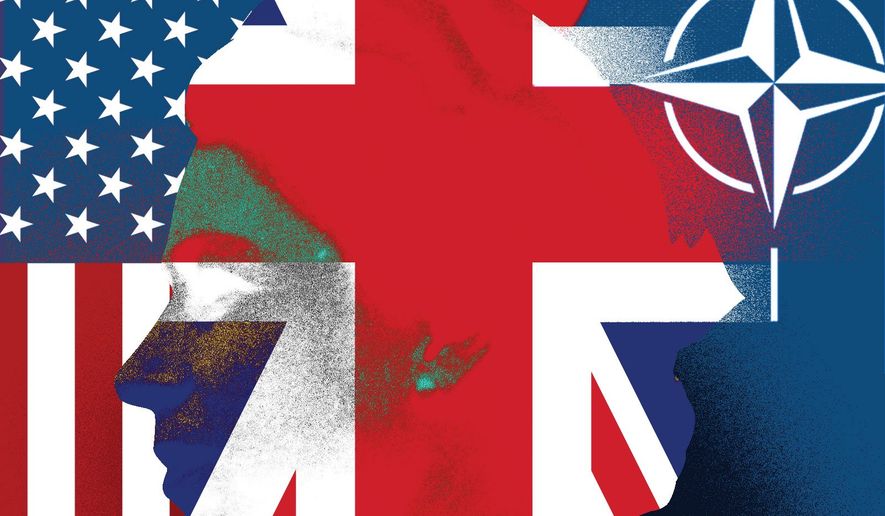OPINION:
Only one U.S. president — Lyndon Johnson — was never received in the U.K. by Queen Elizabeth II during his tenure. By contrast, President Trump will make his third visit in the first term of his presidency when the queen receives him and other NATO heads of state at Buckingham Palace this week.
Mr. Trump clearly knows who our friends are judging by his travel schedule. Given the queen’s constitutional requirement of remaining above politics, her interactions with politicians both British and foreign makes for excellent drama as audiences of the smash series “The Crown” can attest. But the unique role of the world’s most important constitutional monarch can be confusing to many Americans.
Britain transitioned to a constitutional monarchy following the Glorious Revolution of 1688, when William and Mary agreed to cede powers to Parliament. While the monarch would remain head of state, in effect, the representative of the nation’s character and continuity, the actual exercise of political power shifted to the prime minister, the head of government and Parliament.
This is not to say that in constitutional monarchies, the sovereign is insignificant. On the contrary, it provides stability, unmatched even in our own representative democracy, preserving democratic institutions and discouraging extreme political ideologies. Furthermore, as the monarch has a job for life, in the case of Queen Elizabeth, for example, the sovereign is able to become a living encyclopedia of the nation’s institutional knowledge and key adviser to the government, unclouded by the political constraints of elected politicians, as contrasted with the U.S. president who is, in reality, a sort of elected monarch.
The British constitutional monarch’s most important duties are to appoint a government, call and dismiss parliament, and sign off on legislation, just as the U.S. president does. However, in a monarchy, all of these powers are exercised in conjunction with the counsel of the queen’s ministers. Recently, during the Brexit crisis, there have been calls for the queen to step in to resolve the interminable stalemate, but this is nearly impossible to consider as intervening in this way would cause a constitutional crisis that could damage the monarchy significantly.
So what rapport did the queen develop with other heads of government and state? Like any human connections, personalities affect relationships. On July 2019, Boris Johnson became Elizabeth II’s 14th prime minister. There is great speculation regarding the interpersonal relationships of queen and her ministers with wide agreement, that her first prime minister, Winston Churchill was her closest.
Indeed, who better to give counsel to an inexperienced 25-year-old new sovereign, than the 20th century’s greatest, most inspiring, most courageous statesman and wartime government leader? The queen no doubt learned a great deal from Winston during his second term 1951-55. During Churchill’s first triumphal term, the queen’s father, King George VI, was still alive and occupied the throne and prime minister and royal family developed a deep bond as Churchill steered Britain to victory against all odds in the war.
Other British heads of government were a mixed bag of personalities, ideologies and parties. From Harold Wilson (twice), her first Labor PM, reputed to be a KGB spy (later disproved) to Tory Margaret Thatcher with whom legend suggests a difficult relationship. There were other colorful figures such as Tony Blair, who engaged Britain in the unpopular Iraq War, and less colorful ones such as Theresa May, who failed in her singular mission to get Brexit done.
The queen’s relationships with U.S. presidents are noteworthy, especially considering the strength and importance of the bilateral special relationship. Over the course of her 67-year reign, the queen has met 12 of 13 U.S. presidents, forgoing Lyndon Johnson, allegedly due to strain over the fact, the U.K. was in debt and in need of American approval for a loan and America was embroiled in the Vietnam War just as Britain was shedding its colonial holdings.
While the most collegial relations likely occurred between the Windsors and Reagans, Queen Elizabeth has bestowed the coveted state visit on the three most recent U.S. presidents: George W. Bush, Barack Obama and Donald Trump. However, it is probable that the queen’s willingness to extend a third invitation to the Trumps in such a compact time belies the fact that, much to the chagrin of global journalists and leftists of all nationalities, the queen is no never-Trumper.
Indeed, notwithstanding the fact that Elizabeth II might likely enjoy the colorful, unorthodox style of the president, as her country’s chief ambassador, the queen knows the importance of the charm offensive when it comes to favorable post-Brexit trade agreements.
The 93-year-old monarch is a global icon who never puts a foot wrong and is guided by the best virtues — faith and duty. To her great credit, Elizabeth II does not seem the least bit put off by the manufactured scandals of impeachment, hot-air Trump baby balloons or the shrieking disaffected who take to the streets protesting without cause. The queen is far too discerning and imperturbable.
Mr. Trump summed it all up rather well in his toast to the queen at the state banquet last June, when he said, “On behalf of all Americans, I offer a toast to the eternal friendship of our people, the vitality of our nations, and to the long, cherished, and truly remarkable reign of Her Majesty the Queen.”
A reign that esteemed British writer and commentator William Shawcross points out is cherished by the British people because, “They seem to understand their good fortune in not having had revolving-door presidents for the past 70 years but one real Queen, inspired by a lifelong sense of decency, common sense, love of country and Christian duty.”
• Lee Cohen, a senior research fellow on Western Europe for the London Center for Policy Research and the Danube Institute in Budapest, was a policy adviser to the U.S. House Foreign Affairs Committee and founding executive director of the Congressional United Kingdom Caucus.




Please read our comment policy before commenting.